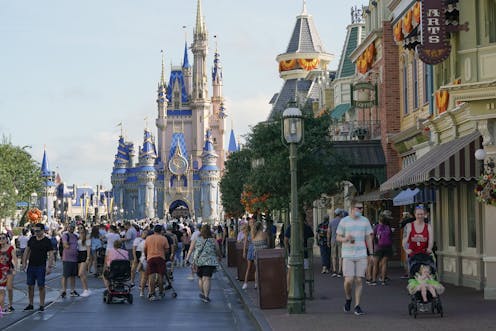
Disney has been making the headlines lately, but it hasn’t been about blockbusters. Recently, people have been up in arms over a ruined Disney park proposal and a couple who opted to have Minnie and Mickey at their wedding instead of food.
Many news articles and social media users were quick to say that for some folks, Disney is a religion — citing mythologies, symbols, rituals, community and regular expensive pilgrimages to the park as central reasons.
But just because many people treat Disney as sacred, doesn’t necessarily mean it’s a religion.
Religion is an incredibly difficult thing to define, yet most people assume they already know what it means. You know it when you see it, right? The problem is, under this logic, anything and everything could be considered a religion.
Practically speaking, there’s nothing wrong with this. The world will not fall apart. But the problem for those of us studying religion is if everything’s a religion, then what are we really studying?
In my own work, I study the ways in which people use popular culture to bring meaning to their life. More than ever before, people are identifying less and less with a religious tradition. This leads some people to look for meaning and identity in the things they love most: like baseball, books, television and even Beyoncé.
My goal here isn’t to argue against those who consider Disney their religion. But I want to challenge how words like religion are used so we can come to a better understanding of what it might mean to treat the Disney parks as sacred.
Not just for kids
Religion is not a universal category. It is a category that was used by Christian colonialists to determine who was similar to the colonists and who was not. And, by extension, who was human and who was not.
I think it is possible to approach Disney adults with empathy and understanding without necessarily calling their relationship to Disney religion.
What’s more interesting is that Disney is being incorporated into important life events, and the ways in which it is meaningful to people.
Disney products — movies, shows, etc. — like any product of popular culture, have always reflected and contributed to whatever’s currently happening politically and religiously.
In response to the wedding and proposal controversies, religious studies scholar Jodi Eichler-Levine argued that “people tend to dismiss Disney” because it’s for kids and it’s fake. But, as she says, “even if the people in the costumes are fake, the emotions are real.”
What Eichler-Levine said reminds me of my Dad who, without fail, will cry every time he sees the Disney World fireworks show.
Paying a hefty price
Religious studies scholar Linda Woodhead argues that religion can be understood in five ways: as culture, identity, relationship, practice and power.
Some people who love Disney incorporate it into important cultural events, while others wear paraphernalia as an expression of identity. Some people come to develop a close relationship to the brand through regular park attendance and by being a part of the Disney-loving community.
I think when people say Disney is a religion, they mean that some people treat Disney as sacred. French sociologist David Émile Durkheim defines sacredness as a category communities ascribe to certain things based on how they treat them.
Many critique Disney adults as being victims of exploitation because Disney merchandise and trips to the parks come at a steep price. Such critiques could also be applied to the history of exploitation in Christian traditions.
Before the Protestant Reformation, Catholic Church leaders asserted that in order to avoid time in purgatory after death, congregants needed to pay indulgences. Doing so would cleanse them of their sins so they could bypass purgatory and secure a place for their soul in heaven — some religious leaders came to the conclusion this was exploitative.
But even today this sort of exploitation is still happening.
I see a big similarity between the previous example and Disney asking consumers to pay a hefty price to come to the parks in order to experience Disney’s magic with their own eyes, ears and yes, even their nose! Similarly, historic religious leaders made believers pay a hefty price to secure their place in paradise after death.
Unfortunately, under capitalism, people are going to be exploited every day.
Disney isn’t arguing that by spending money at their parks your soul will be saved. So by this logic, if some people treat Disney as sacred, is it a big deal?
Hannah McKillop does not work for, consult, own shares in or receive funding from any company or organisation that would benefit from this article, and has disclosed no relevant affiliations beyond their academic appointment.
This article was originally published on The Conversation. Read the original article.







